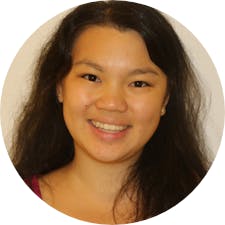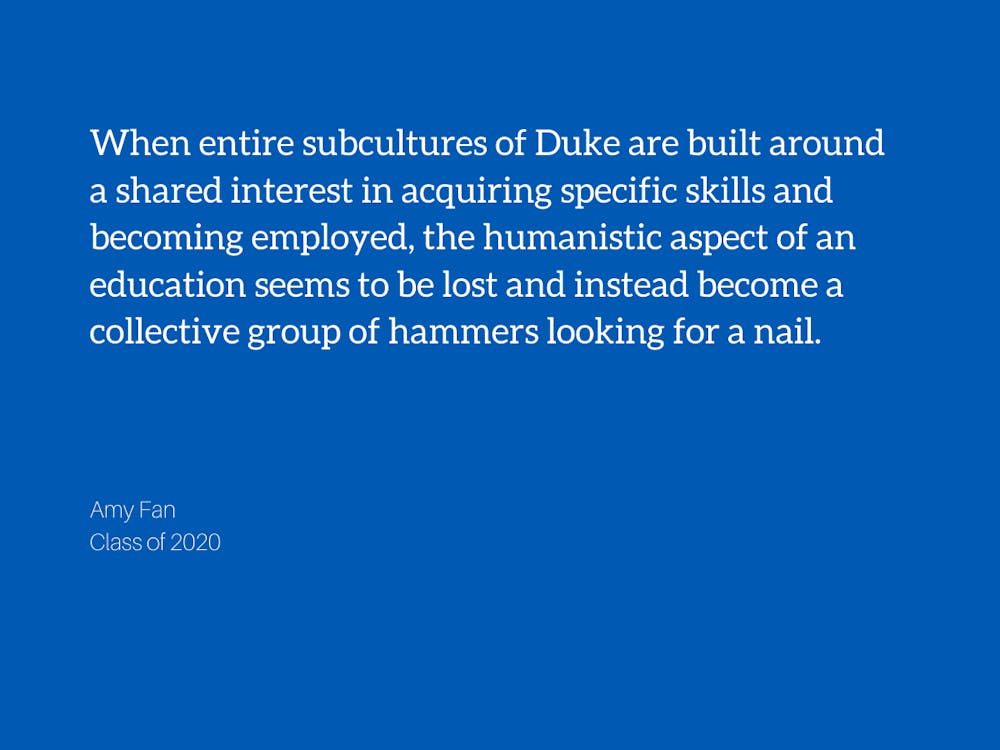Whenever I told adults that I was a) a math major who b) wasn't sure what I wanted to do after graduation, I would always hear something along the lines of, "don't worry, you can do anything with math." Often, the phrase "transferable skills" would come up.
Over the past three years, I've heard a lot about these transferable skills. Typically, they were some mix of technical, reading and writing and other "soft skills." Careers like consulting would give you many of them (and you could use them in any future career, of course!), and majors like economics and public policy were great ways to teach you them. Computer science was also super transferable. Even if you didn't want to work for a large tech company, so many industries also had a need for tech skills. Data analysis? Every place needed one of those! In fact—surprise—many of Duke's most popular majors taught you “transferable skills.”
Part of the appeal of a liberal arts education is its flexibility—regardless of the specific skills that are in demand at any given time, the broader principles are important indefinitely. It's adaptable, in the way that a purely vocational training may not be.
And yet, much of my education has seemed to be focused on two things: getting skills (preferably transferable ones), and then applying said skills to ~any issue~. Sometimes it feels like high school again, where the goal was to "optimize for getting into a good college (you can decide what you're interested in afterwards!)"
What gets lost in this process? What happens when we choose to sacrifice specific knowledge and context in lieu of broader tools?
For one, there’s the narrowing of interests. Is it a surprise that so many students don't know what specifically they're interested in, when that never seemed to be a focus in the first place?
Sometimes, I wonder if this is a conspiracy theory. Keep us uninformed about other career options throughout college (and at least at Duke, most certainly not because of a lack of resources), and then when we’re mildly confused and very insecure, tell us that since we have no idea what we're interested in, to go down a specified path that many ahead of us have done. And when we make that decision, it's our own choice… right?
Furthermore, the narrower a skillset, the narrower the range of problems that can be solved. I've heard people mention that large tech companies (and finance) are the only place where software engineers are treated like "first class citizens." The problems in other industries aren't a good use of their skills.
Perhaps nothing is wrong with that. Maybe nothing is wrong with doing work in an industry where the problems are challenging and interesting and well-defined, where there's a strong sense of satisfaction at the end of the day, surrounded by smart, interesting people?
At the same time, it seems paradoxical that learning skills to solve a broader range of problems instead restricts the types of problems that are perceived to be worth solving. And when entire subcultures of Duke are built around a shared interest in acquiring specific skills and becoming employed, the humanistic aspect of an education seems to be lost and instead become a collective group of hammers looking for a nail.
Finally, an education that offers skills offers very little guidance on how those tools should be used in the first place. Programs like Data+ teach "transferable skills" and promote the idea that data science can revolutionize everything, in every field, without an explicit acknowledgement that the kinds of things that are measured and the kind of data that is released and made public often has strong political moviations. There is little institutional space to examine whether data even should be used to make decisions, when it comes to high stakes decisions, like prison recidivism and teacher evaluations.
A few weeks ago, sophomore Christian Sheerer wrote about how Duke breeds devils. I don't necessarily like that characterization of my peers—I like to think that I go to school around kind, funny, interesting people that aren’t destined for some hell-bound road—but at the same time, good intentions are never enough.
Perhaps I'm a hypocrite. I chose math knowing about its high transferability, and it's helping me in my post graduate plans. The process of learning skills is fulfilling and interesting to me, and I've spent enough time studying math in Perkins to know that. Sometimes I yearn for a world where the metrics of success are clear, where the problems are well-defined, and where I have the tools to help answer them, in the way many of my classes have been.
But also, for my four years here, I've been hoping that someone would point this out to me— that yes, I may be able to acquire skills that will help me in my career, but then what? The best answer I’ve gotten was probably during Orientation Week, after meeting my advisor for the first time. After describing some of my interests, he said, "math and science are great tools for helping to explain the world, but they're not the kind of things that feed your soul."
Three years later, I’m still wondering whether a career really needs to feed the soul, but until then, I would like to focus on what I'm interested in, and not on optimizing my next steps.
Amy Fan is a Trinity senior. Her column, “fangirling,” runs on alternate Thursdays.
Get The Chronicle straight to your inbox
Signup for our weekly newsletter. Cancel at any time.

Amy Fan is a Trinity senior. Her column, "fangirling," runs on alternate Thursdays.

